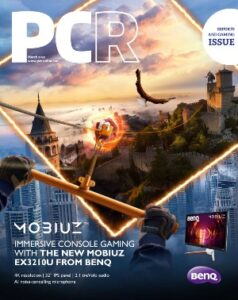Radian Arc CEO, David Cook tells Michele Winny, editor of PCR more about the Radian Arc and Loudplay partnership and what it brings to the worlds of PC gaming and work.
You may not think that the worlds of gaming and business are an ideal mix but think again as a new solution created in partnership between Cloud computing tech provider Radian Arc and Loudplay bypasses the costs of hardware upgrades, enabling consumers to experience the latest in gaming on any device, and businesses can set up their employees for remote or hybrid work with a powerful but flexible cloud solution.
This joint Radian Arc / Loudplay solution will let users play AAA games, and remote or hybrid employees use CPU-intensive business applications, on personal devices like laptops, mobile phones, and smart TVs. Here Michelle Winny, editor of PCR caught up with Radian Arc’s CEO, David Cook to find out more.
Please could you tell us a bit more about the Radian Arc partnership with Loudplay and what this will deliver in terms of GPU Edge infrastructure?
Our partnership with Loudplay provides telco customers with a desktop virtualisation platform suited for both consumer and business uses. With Radian Arc’s patented GPU Edge infrastructure, which is directly installed into telco networks to process data as close to the end user as possible, Loudplay can offer lower latency for both gaming and enterprise applications and expand its user base across the globe.
Please could you explain more about the latest capabilities in enabling end users to run the latest games on laptops, mobile phones, and smart TVs at a fraction of the price of high-end computers?
Major video games are targeted to console or high-end gaming computer owners, but this is cost prohibitive for many. AAA games generally cost $60 or $70, the latest consoles cost around $500, and a top of the line gaming PC easily will run for more than $1,000 (if you can find all the components during a chip shortage). Radian Arc and Loudplay’s Cloud PC solution basically allows users to virtually rent a powerful PC in the cloud and stream it to a personal device. Most people have smartphones and tablets, or a laptop less powerful than a gaming PC. Those devices, plus a broadband or 5G data connection, are a much more accessible and far more cost effective option.
How does the solution support remote or hybrid employees?
In the same way we provide a high-end PC/console-quality experience for gaming, Loudplay and Radian Arc can give employees access to virtual resources powerful enough to run CPU-heavy applications like Adobe Photoshop on less powerful personal devices. This removes the need to bring office equipment home or upgrade all employees’ devices in a remote or hybrid setting, and it can represent significant cost-savings.
Companies who subscribe to this solution via telcos can create customisable profiles based on employee roles and responsibilities, equipped with preinstalled software of their choosing. Loudplay can also store customer data on the cloud, solving potential storage issues.
How does this enhance the gaming experience?
Radian Arc and Loudplay enhance the gaming experience in two main ways: improving performance and increasing portability. One of the main complaints from users of other cloud gaming offerings is poor latency, which can ruin the gaming experience, especially for multiplayer titles. Our GPU Edge solution includes high-performance AMD GPUs installed in the telco’s network, reducing latency by processing data as close to the end user as possible. This also reduces game start times to as little as 15 milliseconds.
In addition to performance improvements, users can turn any device into a high-end gaming machine to access any PC games they own. Gamers can effectively bring their entire gaming library on the go with them. This is made possible by Radian Arc’s telco partnerships, which ensure a more consistent connection than other services by being directly integrated into telcos’ 5G or fiber networks.
What are the current demands being placed on gaming tech providers to keep up with gaming tech demands?
Everyone always wants prettier, faster, better games, but between costs and access, consoles and PCs aren’t an option for a lot of consumers, especially in the developing world. Radian Arc and Loudplay bypass those limitations by allowing users to stream their games via the cloud. The other challenge many tech providers face are supply chain issues. The supply of available next-gen consoles did not match the demand for months and months after they launched. And on the PC side, we are currently in a global chip shortage, which means many PC gamers have not been able to upgrade critical components like GPUs. Radian Arc has a strong relationship with AMD and is the only non-hyperscaler with access to AMD high-performance, enterprise-level GPUs during this shortage. Cloud gaming is a growing market with a projected value of over $6B by 2024. Our relationship with AMD allows us to continue to operate and place our infrastructure inside telco networks amidst shortages, so we can meet the growing demand as more and more cloud gaming services go live in 2022.
What would you say are the latest developments in the gaming sector?
Cloud gaming has been in active development for a few years now, so while it might not be the latest development, the strides it is making are significant. Radian Arc’s GPU Edge infrastructure can currently support up to four games at once per GPU, which historically only run one at a time on consoles or gaming PCs. We are actively working to increase the number to 12 games per GPU, which we hope to achieve in the coming months, making cloud gaming more economical and efficient in the future.
How does the partnership cater to professional needs?
Radian Arc and Loudplay offer a practical remote or hybrid working solution for businesses, particularly professions that require more computing power than others. Designers and engineers who work with AutoCAD or filmmakers using FinalCut Pro can’t run those programs on personal machines, unless they have robust PCs of their own. By using our advanced virtual desktop, these kinds of companies can eliminate the costs for hardware needed to make their work possible.
How is the digital divide a huge problem now, please could you explain more on why?
Many consumers around the world only have personal devices like smartphones or laptops and either cannot access or afford gaming consoles or computers. These markets are underserved because most games are developed with console and gaming PC owners in mind.
For business and the enterprise, the COVID-19 pandemic has completely changed the concept of “the office” with more and more employees working fully remotely from home or in hybrid setups. Our partnership with Loudplay can help businesses with large workforces working remotely to access and run specialised applications without the need for bringing computing equipment home or shipping it to the workforce.
How will the two companies look to address this issue?
Cloud gaming serves as an equalizer for gaming markets with different degrees of access and affordability, and for employees of businesses who require specialised software to do their jobs. Providing virtual access to advanced physical hardware makes both work and play more affordable and accessible.
How is 5G and fibre changing the face of gaming?
5G and fiber provide faster, more stable connections. This improves the viability of cloud gaming by helping to offer smoother, more consistent experiences for users with less latency issues. Our strategy of placing our GPU Edge technology directly inside of telcos’ 5G or broadband networks takes full advantage of their improved capabilities.
Read the latest edition of PCR’s monthly magazine here:
Like this content? Sign up for the free PCR Daily Digest email service to get the latest tech news straight to your inbox. You can also follow PCR on Twitter and Facebook.
 PCR Tech and IT retail, distribution and vendor news
PCR Tech and IT retail, distribution and vendor news




